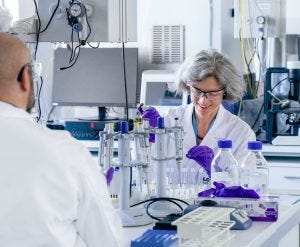Content Spotlight
Podcast: MilliporeSigma says education vital to creating unbreakable chain for sustainability
MilliporeSigma discusses the importance of people, education, and the benefits of embracing discomfort to bolster sustainability efforts.

Lonza’s drug product services division is participating in the RealHope project to establish challenges that contribute to protein instability during the handling process.
The Real-World Handing of Protein Drugs – Exploration, Evaluation and Education (RealHOPE) project aims to destabilize protein-based therapeutics by measuring real-life events during drug handling to significantly improve the safety and effectiveness of the drug development process.
According to Swiss contract development manufacturing organization (CDMO) Lonza, assessing protein stability is required to ensure process optimization and the efficacy and safety of therapies. Lonza will share its knowledge, experience, and provide laboratory services for the project.

Lonza drug product services in Basel, Switzerland. Image c/o Lonza
Additionally, the firm said it is well known that heat, vibrations, and sunlight exposure can affect the stability of proteins, but it remains unclear about the effects that handling during storage, shipment, and administration has on the products.
“To this date, there has been little research in this area,” Ahmad Sediq, senior group leader, formulation development, Drug Product Services at Lonza told us.
“RealHOPE represents the first project with such a thorough and large-scale research study set up to understand the handling of these types of products. The ultimate goal is to improve processes at the level of drug development and end-user experience. In addition, the outcome of this work will foster more dialogue with regulatory authorities on this topic, where clearer guidelines are needed.�”
The RealHOPE project will bring together industry experts, hospital pharmacies, and patient organizations. The project has said surveys will be conducted across hospital professionals and patients at home regarding their personal use and handling of protein drugs.
As the simplest handling steps have the potential to affect the quality of these types of drug products, Lonza says the process of mapping out how they are treated and leave the manufacturing facility provides partners of the project with the knowledge to ensure quality.
In addition to this, the technology can then be used in hospitals and different settings for product quality assessments where the drugs might be further process by dilution and mixing.
“The RealHOPE project will bring more light into the end-user handling of protein-based drugs – this means that the focus of activities will be on the stage once a batch of the drug product leaves the manufacturing site,” said Sediq.
He continued: “In addition, the activities will focus on evaluating novel analytical methods to investigate the quality of the product on a small scale. This bundle of new knowledge and technology will help the drug developers understand the stress conditions that the product may experience during handling and assess its impact on the drug product quality. At Lonza, we aim to apply state-of-the-art simulation studies and analytical technologies to help our customers develop their products in the best way possible. After all, a better product quality means more efficient and successful treatment of patients, and that’s a key goal for Lonza.”
You May Also Like